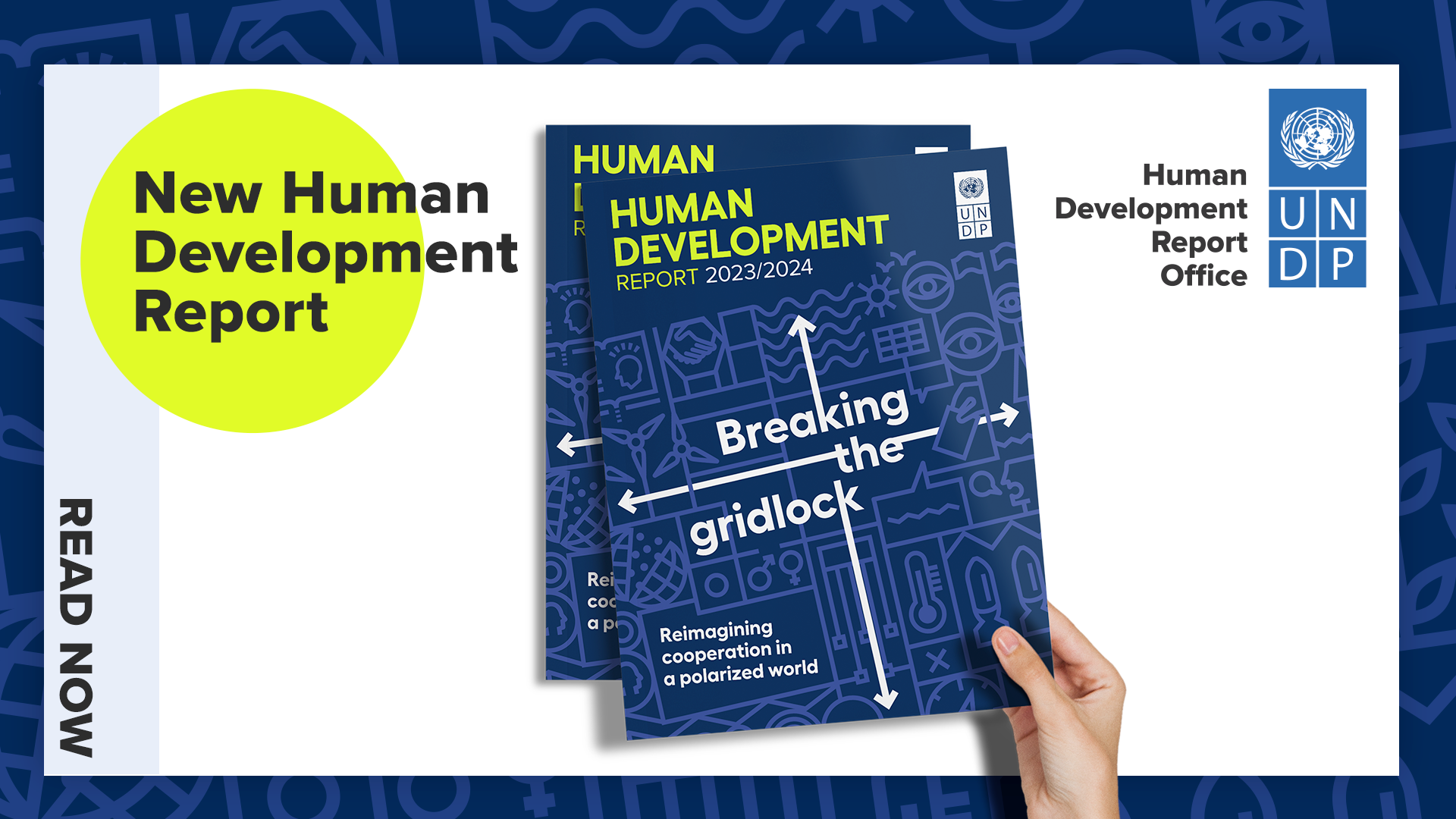Rich countries attain record human development, but half of the poorest have gone backwards, finds UN Development Programme
March 13, 2024

New York, 13 March 2024 - Uneven development progress is leaving the poorest behind, exacerbating inequality, and stoking political polarization on a global scale. The result is a dangerous gridlock that must be urgently tackled through collective action, according to a new report released today by the United Nations Development Programme (UNDP).
The 2023/24 Human Development Report (HDR), titled “Breaking the Gridlock: Reimagining Cooperation in a polarized world", reveals a troubling trend: the rebound in the global Human Development Index (HDI) – a summary measure reflecting a country’s Gross National Income (GNI) per capita, education, and life expectancy – has been partial, incomplete, and unequal.
The HDI is projected to reach record highs in 2023 after steep declines during 2020 and 2021. But this progress is deeply uneven. Rich countries are experiencing record-high levels of human development while half of the world’s poorest countries remain below their pre-crisis level of progress.
Global inequalities are compounded by substantial economic concentration. As referenced in the report, almost 40 percent of global trade in goods is concentrated in three or fewer countries; and in 2021 the market capitalization of each of the three largest tech companies in the world surpassed the Gross Domestic Product (GDP) of more than 90 percent of countries that year.
“The widening human development gap revealed by the report shows that the two-decade trend of steadily reducing inequalities between wealthy and poor nations is now in reverse. Despite our deeply interconnected global societies, we are falling short. We must leverage our interdependence as well as our capacities to address our shared and existential challenges and ensure people’s aspirations are met,” said Achim Steiner, head of the UN Development Programme. “Our problems are intertwined, requiring equally interconnected solutions. By adopting an opportunity-driven agenda that emphasizes the benefits of the energy transition and of artificial intelligence for human development, we have a chance to break through the current deadlock and reignite a commitment to a shared future."
Mongolia ranked 96 out of 193 countries and territories in the report with a Human Developmen Index (HDI) value of 0.741, an increase of 28 percent since 1990. Between 1990 and 2022, Mongolia’s life expectancy at birth increased by 13.9 years, mean years of schooling increased by 0.9 years and expected years of schooling increased by 4.4 years while gross net income per capita [1] increased by 127.4 percent according to the report.
“We are pleased to see the overall growth in Mongolia’s human development index; however, the country’s Planetary pressures-adjusted HDI and Inequality-adjusted HDI show a decline in 16.5% and 13%, respectively, from the HDI. This indicates that more is needed to be done in Mongolia to address inequality and the planetary pressure and UNDP stands ready to support the Government and people of Mongolia in these efforts” said Matilda Dimovska, UNDP Resident Representative in Mongolia.
The report argues that advancing international collective action is hindered by an emerging ‘democracy paradox’: while 9 in 10 people worldwide endorse democracy, over half of global survey respondents express support for leaders that may undermine it by bypassing fundamental rules of the democratic process, as per data analysed in the report. Half of people surveyed worldwide report having no or limited control over their lives, and over two-thirds believe they have little influence on their government’s decisions.
The report emphasizes how global interdependence is being reconfigured and calls for a new generation of global public goods. It proposes four areas for immediate action:
- planetary public goods, for climate stability, as we confront the unprecedented challenges of the Anthropocene;
- digital global public goods, for greater equity in harnessing new technologies for equitable human development;-
- new and expanded financial mechanisms, including a novel track in international cooperation that complements humanitarian assistance and traditional development aid to low-income countries; and
- dialing down political polarization through new governance approaches focused on enhancing people's voices in deliberation and tackling misinformation.
In this context, multilateralism plays a fundamental role, the report argues, because bilateral engagements are not able to address the irreducibly planetary nature of the provision of global public goods.
***
To learn more about the 2023 Human Development report, visit: https://hdr.undp.org/content/human-development-report-2023-24
About UNDP
UNDP is the leading United Nations organization fighting to end the injustice of poverty, inequality, and climate change. Working with our broad network of experts and partners in 170 countries, we help nations to build integrated, lasting solutions for people and planet. Learn more at www.undp.org/mongolia or follow at @UNDPMongolia.
About the Human Development Report Office
The mission of the Human Development Report Office (HDRO) is to advance human development. The goal is to contribute towards the expansion of opportunities, choice, and freedom. The office works towards this goal by promoting innovative new ideas, advocating practical policy changes, and constructively challenging policies and approaches that constrain human development. The office works
Media Contacts:
- In New York City: stanislav.saling@undp.org +1 347 653 1980 or victor.garrido.delgado@undp.org +1 917 995 1687
- In Geneva: sarah.bel@undp.org +41 79 934 11 17
- In Bangkok: cedric.monteiro@undp.org (+66 2 304 9100)
In Mongolia:erdenesukh.otgonbayar@undp.org (9909-6434)
[1] Gross national income (GNI) per capita based on 2017 purchasing power parity (PPP) is converted to international dollars using purchasing power parity rates. An international dollar has the same purchasing power over GNI as a U.S. dollar has in the United States. Data are in constant 2017 international dollars.

 Locations
Locations



